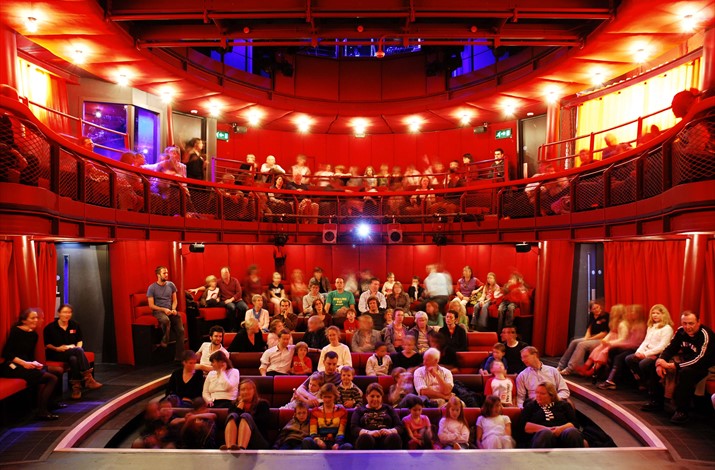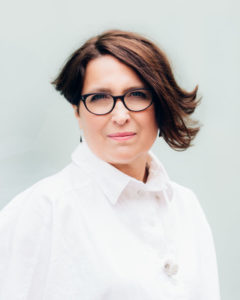
Kate Cross is one of the most influential theatre administrators you may never have heard of. As the driving force behind the creation of the egg, and as its first (and present) executive director, she was instrumental in the conversion of the old cinema that was the previous incarnation of the building, into a purpose built home for young people’s theatre. And when we say, ‘purpose built’, what other theatres can you think of where there is a ‘cooling off room’ for exasperated parents (at the antics of their offspring) where they can extract themselves from the auditorium yet maintain a close eye both on proceedings and their little darlings; or where a little curtained peephole through which the nervous of disposition can survey the scene without being part of the hubbub?
 Having come to Bath’s Theatre Royal from the Salisbury Playhouse she quickly realised that young people’s theatre was almost a grace and favour affair with productions often dumped onto the front of the stage with a totally incongruous set for the evening’s show as a background, leaving the young audience scratching their heads as to its relevance to what they were watching. Energised by this unsatisfactory state of affairs she set about creating a dedicated space whilst simultaneously driving a quality agenda that aimed to harness nothing but the best talent.
Having come to Bath’s Theatre Royal from the Salisbury Playhouse she quickly realised that young people’s theatre was almost a grace and favour affair with productions often dumped onto the front of the stage with a totally incongruous set for the evening’s show as a background, leaving the young audience scratching their heads as to its relevance to what they were watching. Energised by this unsatisfactory state of affairs she set about creating a dedicated space whilst simultaneously driving a quality agenda that aimed to harness nothing but the best talent.
Relevance to the target audience is all, but not as one might fear. The tone was not to be patronising – no moralising tone or patronising light-bulb outcome required. No, for Kate Cross the object is to get a young audience to experience new worlds – the new world of the imagination and the new world of themselves seen anew. One of the salient reasons to engage children early in their cultural development is that up to a point they go to the theatre with no particular expectations; they don’t go to be entertained or stimulated or uplifted or enlightened or preached at or to gawp at a TV celebrity, but inevitably and without a care either way they will be stimulated, their imaginations will be engaged, they will learn – for that is simply the nature of children, that is what they do. A recent production, One Item Only, using a few bits and pieces of the sort you might find in any child’s bedroom, some simple drawings and fingers walking across landscapes of the imagination, tells the story of a young refugee struggling alone to Europe. Here was a show with no political message, but which gave the young audience something they could relate to, a perspective from which to judge events they may see or hear about in the media.
A thread that runs through the whole egg programme is the stimulation of young minds. An important aspect of this is the School Without Walls project which, as its name suggests gets children out of the usual learning environment as a way of engaging their interest and imagination – although if truth be told it is more about giving teachers a new perspective on what they do. It is a way, in her words, to ‘Halt the mincemeat machine’, for long enough to give teachers a glimpse of the alternatives as the pressures to perform to the government’s song sheet become harder to ignore.
Meeting Kate Cross in the street you might be struck by a confident woman, casually smart, comfortably on trend; a contemporary figure you’d think, probably successful at something, yet nothing about her would suggest a theatrical mogul; no scary demeanour or impatience with the moment – that feeling you sometimes get with driven people that they wished they were somewhere else and talking to someone a little more important than you. No, she has that other quality of success, generosity; happy to talk, happy to listen, antennae always on. But focussed she most definitely is. Her ambition for the egg (no capitals, no airs and graces) is boundless, bound up as it is with an evident passion for theatre and education, by which I mean: theatre-in-education, theatre and education. Few, if any, theatres in the UK can match the egg for the depth of its commitment to young people. The Incubator Showcase, for example, which enjoys financial input from the Arts Council and those enlightened bastions of artistic and educational support, the Esmée Fairbairn Foundation and Leverhulme Trust, invites and encourages an impressive breadth of child and youth focussed, artistic enterprise, allowing it the space, time, and freedom from material cares to develop and flourish. Add to this Ms Cross’s constant search – which takes her far and wide – for work of the highest, most engaging quality and the result is an egg programme that is the equal in artistic ambition, mutatis mutandis, to its celebrated neighbour, the Ustinov.
The vision for the egg is proudly reflected in the post-graduate course it runs in collaboration with Bath Spa University, which encompasses all the great variety of skills and disciplines which go into the creation of theatre for young people, including, inter alia, performance skills, puppetry, writing, production and educational theory. Back on home turf, the theatre school and youth theatre offer 5-18 year olds opportunities for that mind expanding and personal development activity that is the peculiar domain of theatre. The egg really is all it is cracked up to be: happy the school that shares their riches, happy the parent who discovers their wares and happy the child who shares the joy. In the absence of a government enlightened enough to make such opportunities available to all we can only be thankful for Kate Cross and all those who share her ambition. Graham Wyles July 2017
© Graham Wyles/StageTalk Magazine 2017 All rights reserved

